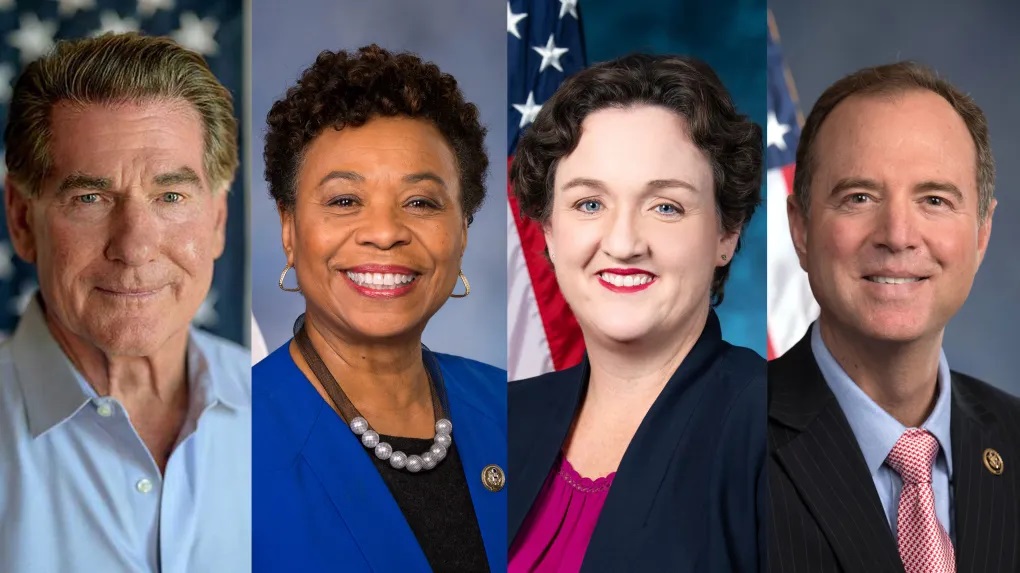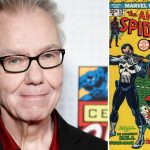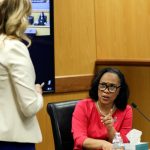With just three weeks to go until the March 5 Primary Election, California’s four leading candidates for U.S. Senator met for a fiery final debate, a far cry from the months of polite campaigning in the leadup to Tuesday’s showdown.
It was the last chance for the four — Democratic Reps. Adam Schiff of Burbank, Katie Porter of Irvine and Barbara Lee of Oakland as well as Republican ex-Dodger Steve Garvey — to make their case to voters before the primary.
And Porter took it and ran with it, throwing barbs at frontrunner Schiff from start to finish.
The stakes of the showdown were highest for the Irvine Democrat, who according to the latest poll results, has fallen into third place behind front runner Schiff and Republican Garvey. Earlier polling had found Garvey and Porter deadlocked for second place.
“(The poll) is an opportunity to see how Porter reacts,” said Matt Lesenyie, assistant professor of political science at CSU Long Beach ahead of the debate.
And react she did. From the get-go, Porter went after Schiff, saying that career politicians haven’t focused on challenges everyday Americans face, including the cost of housing, childcare and elder care.
“My colleague Rep. Schiff, for example, says he wants to bring down the cost of childcare, but he isn’t on either of the two major Democratic bills that would do that,” she said. “He’s not on a bill to provide rental assistance to people for housing, although all of these things are in his plans. That’s the gap between Congressman Schiff and candidate Schiff.”
Schiff retorted that “there’s nothing easier than putting your name on a bill,” and that he’s “introduced numerous bills to bring down the cost of childcare.”
Earmarks, where individual members of Congress can bypass the federal government’s regular spending process and request money for a local project, was another topic Porter brought up to lambaste Schiff.
“There is a candidate on this stage who has done that again and again, getting earmarks for his private corporate donors who are big defense contractors,” she said.
Schiff responded that any Senator who doesn’t seek earmark money “is going to be a gift to the senators from every other state of the union who will fight for resources for their state.”
Porter, who sought to position herself as an outsider unbeholden to special interests, took yet another swing at Schiff on the climate.
“I’m different than Rep. Schiff. He’s taken corporate PAC checks from BP, from Sempra, from SoCal Gas, and these are household names. They are polluters,” she said. “So people can count on me to do Washington differently.”
Schiff, in response, accused Porter of not being fully clear about her record of “taking thousands of dollars from people in the oil industry, thousands from Wall Street bankers, thousands from people in Pharma.”
“The problem with purity tests as Rep. Porter likes to establish is invariably the people establishing them don’t meet them,” he said.
The top two vote-getters in the primary will advance to the November ballot in the race to replace former Senator Dianne Feinstein, who died in September 2023.
During the hourlong debate, candidates answered questions on several hot-button issues, ranging from inflation, the federal budget deficit, U.S defense spending, the role of the U.S. in foreign policy and artificial intelligence.
Lee, who stayed out of her Democratic colleagues’ fight, touted her progressive agenda throughout the evening as well as how her lived experiences will inform her decisions as Senator.
“I was born in El Paso, Texas, in an immigrant community in a border town…I understand the importance of comprehensive immigration reform,” she said. “It is a shame and disgrace that we cannot allow our DACA students, our Dreamers to become United States citizens. In the Senate, that would be the first thing I would do.”
Porter also said she would support citizenship for Dreamers, young immigrants brought to the U.S. unlawfully through no fault of their own.
On climate change, Lee recalled growing up in a neighborhood that had a smelter plant emitting toxic chemicals and pledged to support a “just transition for workers from a fossil fuel economy to a green economy.”
She was also the only candidate on stage to call for an unconditional ceasefire in Gaza, as she had in previous debates and on the campaign trail.
Garvey spoke in generalities throughout the debate and did not offer specific policy proposals. When pressed by a moderator on what will be his impact or legislation he can introduce in the Senate, he said one of the most important things he can do is “get back to reading, writing and arithmetic to make sure that the next generation of our children are the new leaders and capable.”
Tuesday night’s showdown, hosted by NBC4 and Telemundo 52 at the Universal Studios Lot, was a far cry from the first two televised debates between the four, which were remarkable for their lack of memorable remarks.
“It’s like a barrel of fireworks with no ignition. At this point, I really thought there was going to be more drama, but it has been a sleeper,” said Matt Lesenyie, assistant professor of political science at CSU Long Beach on the eve of the debate.
Related Articles
Poll: Garvey rockets into 2nd behind Schiff. Here’s how that could be good for Democrats
California US Senate candidates to face off Tuesday in final pre-primary debate
Ro Khanna: If Rep. Barbara Lee had campaign cash, she’d be in top two for U.S. Senate
Election 2024: Your one-stop shop before you vote in California’s March 5 primary
Newton: Adam Schiff is using GOP long shot to weaken rivals
During the initial debates, candidates discussed a range of hot-button topics — including immigration, the economy, former President Trump, homelessness and the Israel-Hamas war — but kept their tempers cool. The three Democratic candidates agreed on most points and focused their criticisms at Garvey’s Republican platform, but avoided throwing any truly devastating punches at the political newcomer.
Schiff, for his part, has worked to keep the cameras on himself and Garvey and avoided drawing his Democratic competitors into the fray, Lesenyie remarked.
“I think Schiff wants to direct attention to Garvey to try and set him up as the likely second place guy,” he said. It would be in Schiff’s favor to face a Republican challenger in deep blue California come November.
That was the case on the debate stage Tuesday evening, where Schiff threw a couple punches at Garvey, most notably when Schiff tried connecting Garvey to former President Donald Trump, a figure Garvey has seemingly tried to evade on the campaign trail.
“I agree with Mr. Garvey we should be the torchbearer of democracy,” Schiff said. “But how is that possible with Donald Trump, how is that possible with someone that Mr. Garvey repeatedly supported?”


